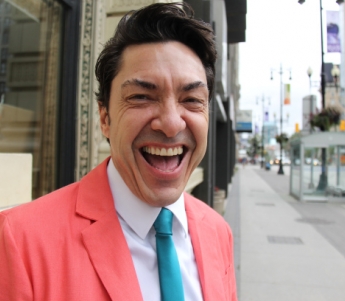Closeted Stories



Closeted Tweets
-
'''' 57 years ago
Michel Fillion
 “I used to think as my dad as super handsome. I never looked at my mom as beauty, I looked at my dad as beauty.”
“I used to think as my dad as super handsome. I never looked at my mom as beauty, I looked at my dad as beauty.” Homosexuality wasn’t discussed in St Jean Baptiste—the small, French Catholic town Michel Fillion graduated high school from in the late 70’s.
Michel says he didn’t think much about sex or dating in high school. He was more focused on his studies and after-school clubs.
“Sex wasn’t that big of a hunger, like with other people. My hunger was more in my studies.
I was in most of the clubs actually. The only thing I did not participate too much in was the noon-hour and after-school [physical education] programs,” says Michel.
“I was in the drama club, I was in debate club, I was in the yearbook committee. I loved high school.”
As a closeted gay student, Michel is thankful he grew up in a small country environment and not a big city like Winnipeg.
“No gay person was bullied. It wasn’t the same life as in the city
“Lets say there was someone who was a little bit more ‘femmy’—he was tolerated, but it was left at that. Privacy was extremely important so no one got to know you to that point.”
But Michel wasn’t able to leave sex out of his high school experience entirely.
“I dated one girl in high school. And I didn’t dump her, she dumped me for one of those redneck tough ones”
His first encounter with homosexuality happened when his older brother came home from the Winnipeg private school he attended with a new magazine.
“There was an article in that magazine about homosexuality and I saw that and I was so interested in the article that I kept the paper and I hid it for years. Every once and awhile I would take it out and read it. It was my only link to the gay world.”
Before graduating in 1977 and moving to Winnipeg to begin University, Michel began to see the dangers of living in a tight-lipped community unwilling to discuss sexuality.
“A lot of gay people moved to the city, to be with people like themselves and to have some small protection.
It wasn’t dangerous in the country at all but you still felt uneasy.”
Michel believes LGBT youth today have an easier time confronting their sexuality, leading to a healthier gay community.
“Gay kids today don’t act the same as gay people who are 50, 60, or 70. There’s huge difference in mannerisms. [Young people] are much more expressive of their sexuality.
“Older gays have been so much more damaged, and that’s permanent. Like especially when the HIV/AIDs crisis came out, that was a total slammer. People basically went back in the closet.”